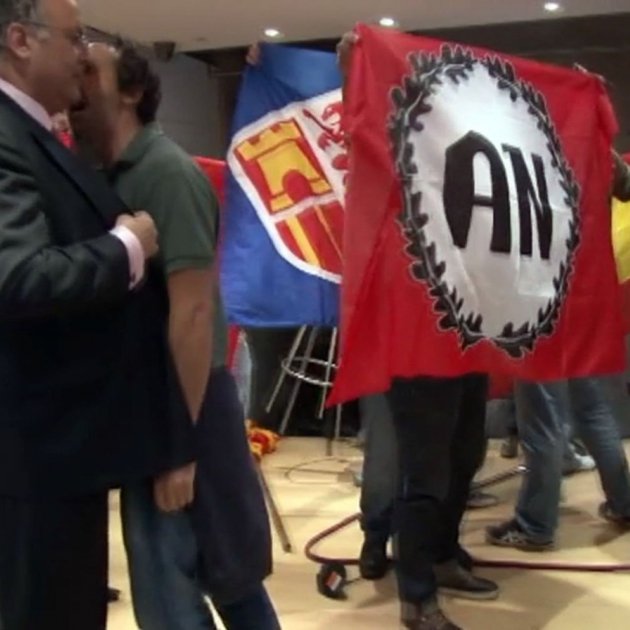It took a strangely long time until they were put in jail, and almost no time until they have got out. Seven of the eight extreme-right supporters imprisoned for the assault on the Blanquerna, the Catalan cultural centre in Madrid, amidst the centre's Catalan National Day celebrations in 2013, have already been granted an open prison regime in prison, according to Catalonia's TV3. And moreover, they received the prison privileges in record time, which in several cases means less than a month after they entered the jail. Their jail sentences are all from two years and seven months to two years and nine months, for offences of public disorder, after the Constitutional Court had forced the removal of an aggravating factor of ideological discrimination, and a consequent reduction in their jail sentences.
The open prison regime, known in Spain as the Tercer Grado (Level 3), has been obtained extraordinarily quickly by the men, and means that they will only return to prison to sleep during the week, from Sunday night to Thursday night, and will be free to leave prison during weekdays as well as having the whole weekend free. The leaders convicted in the Catalan independence referendum trial had all spent at least two years in jail, mostly on remand, and once granted, their privileges ended up being revoked by the Supreme Court.
The last of the Madrid attackers to obtain this Level 3 regime was Pedro Chaparro, leader of the neo-Nazi party Democracia Nacional, who had also managed to postpone his entry into prison, on the grounds that he was about to become a father. He finally entered jail on March 14th, and in less than a month he has already obtained the weeknights-only regime. Chaparro had another sentence, one year in prison, for threatening photojournalist Jordi Borràs on a Spanish National Day rally in 2015 in Barcelona. The same thing happened with Manuel Andrino, the national leader of La Falange, who entered on December 27th and within a month was already enjoying his new prison status.
Thus, only one of the eight convicts sent to prison has not obtained the more relaxed regime. This is Íñigo Pérez de Herrasti, a militant of the neo-Nazi Alianza Nacional, brother-in-law of the former PP minister Íñigo Méndez de Vigo and second cousin of both another ex-minister Pedro Morenés and Borja Prado, president of the major Spanish utility Endesa. Pérez de Herrasti had already been sentenced in 2000 to fourteen years in prison for planning an attack on relatives of ETA prisoners with weapons and explosives.
More than 8 years till they went to jail
The Blanquerna case went round and round in the courts, but there was finally a firm decision by the Supreme Court on July 23rd, 2020, already almost two years ago. It came after the Constitutional Court forced the Supreme Court to rewrite the sentence, removing the aggravating factor for ideological discrimination. This abolition meant a considerable reduction in the sentences for the fourteen convicts: they now range from two years and seven months to two years and nine months in prison for a simple crime of public disorder. The court that tried them in the second instance, the Supreme Court, also rejected their request for a pardon. It has been eight and a half years since the extremists stormed the Catalan government delegation, at the Blaquerna centre in Madrid, to sabotage the events on the Diada of September 11th, 2013.
